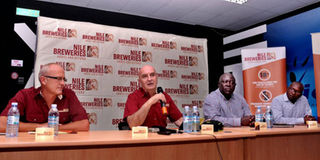How global corporate takeover is eating into Nile Breweries

Left to right: NBL country director James Bowmaker, with outgoing managing director Greg Metcalf, former western region sales manager Julius Kabwiso and former marketing director Daniel Ogong, address an exit media briefing in Kampala last week. COURTESY PHOTO
What you need to know:
- Exits. Several mid-level and top managers have opted to leave the company.
Kampala.
Mr Daniel Ogong, 43, had worked for Nile Breweries Limited (NBL) for the last 15 years until February 2017 when he threw in the towel and opted to resign.
His resignation came at a time he was marketing director for seven years, and was also serving on the board of the beer manufacturer.
The speculation around his departure from NBL has been very wide; with some pointing out that he had been fired.
“I was asked to stay on at NBL but I refused and decided to leave. The option for me to leave was informed by the change in the structure of ownership and operations at NBL,” Mr Ogong explained on the sidelines of an NBL media briefing about the departures from the company last week.
Takeover
In 2016, Anheuser-Busch InBev (AB InBev) completed the takeover of SABMiller for a consideration of about $117b (Shs421 trillion) to create the fifth largest global consumer products company, according to Bloomberg.
With headquarters in Belgium, AB InBev had no presence in Africa and SABMiller provided that market. It is now in 50 countries around the world.
NBL was a subsidiary of SABMiller and with the acquisition, it is now an AB InBev subsidiary.
According to Mr Ogong, AB InBev had a separate strategy on how it operates globally.
“NBL was operating autonomously of SABMiller with the ability for us to make decisions on the new products, market growth, and strategy. However, with the new shareholders, that autonomy was taken away. That informed my decision to leave,” he added.
Job losses
Mr Ogong is not the only person who is leaving the company.
Mr Greg Metclaf, the managing director, will be leaving NBL after three years for Canada.
AB InBev had in January 2017 appointed him operations director, Uganda, Kenya and South Sudan.
“There have been a few positions affected, but they make up a very small percentage of our staff component. Those positions affected result from what AB InBev sees as more efficient ways of doing things,” Mr Metcalf explained.
Mr Paul Bitarabeho, the director human resources also departed the company.
Mr Julius Biingi Kabwiso, who was the regional sales director for the western region, also opted for early retirement and was recently appointed an NBL distributor for Hoima District.
NBL has not revealed the actual numbers of people who have left the company but it is believed that several mid-level and top managers opted to leave.
Globally, AB InBev is said to have at least layoffs of about 5,500 people. Uganda was not spared.
“AB InBev have been very impressed with the way we are performing in Uganda and they want that trend to continue. So I wouldn’t anticipate they would change too much to what is a winning formula. Of course, they have some difference ways of doing things and that will bring about some changes, but I don’t expect those to dramatically impact on NBL,” Mr Metcalf explained.
Operational changes
However, there are changes that are rather significant. NBL will no longer have the position of managing director.
Mr James Bowmaker, previously the sales and distribution director has now been appointed a newly created position country director.
Both the country director and Marketing director will be reporting to the AB InBev regional offices in Johannesburg, South Africa.
The marketing director will not be reporting to the Country Director.
“Essentially, I and the marketing director report to the regional offices. The marketing director will be responsible for marketing and I will be responsible for sales. However, when there are matters to sort out in terms of policy, that is where I come in,” Mr Bowmaker said.
Additionally, Mr Onapito Ekomoloit’s role is also changing from corporate affairs director to legal and corporate affairs.
The changes in the managers, even as NBL will not admit may also change operations.
Mr Bowmaker also hinted at changes in the distribution channels of the company noting that “a company has to evolve if it is to remain competitive.”
Daily Monitor also understands that AB InBev will be changing its advertising strategy by sourcing for an agency to handle its Africa business instead of individual countries sourcing their own agencies.
This is expected to slightly reduce the advertising spend of the beer company. Bloomberg estimates that AB InBev is targeting savings of 14 per cent in 2017.
NBL has a beer market share 56 per cent, with its rival Uganda Breweries Limited (UBL) with 54 per cent after making gains of about 3 percentage points in 2016.
Ownership changes
1951. Founded by a group of businessmen
1957. Muljibhai Madhvani acquires NBL
1972. President Idi Amin nationalises NBL
1992. Government returns NBL to Madhvani
1997. South African Breweries (SAB) acquires 40 per cent of NBL
2001. SAB fully acquires NBL
2002. SAB acquires Miller Brewing Company in America. Rebrands to SABMiller
2016. AB InBev acquires SABMiller




